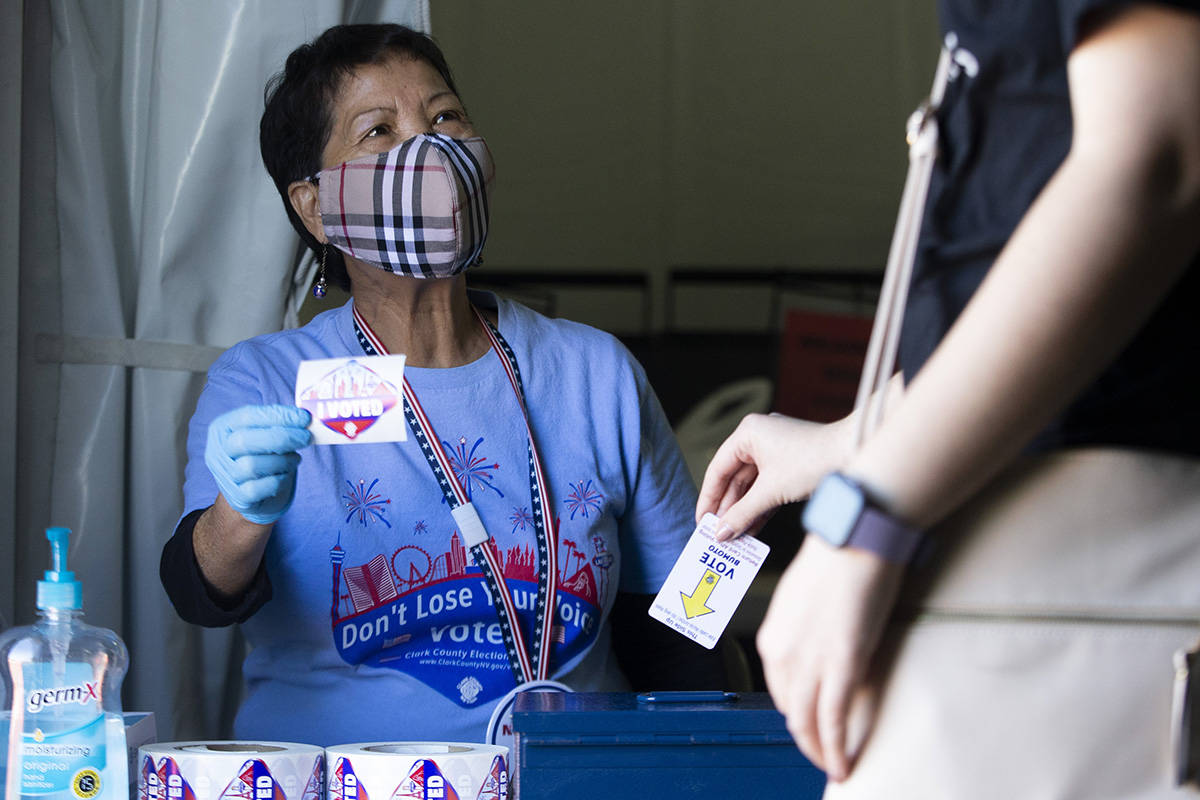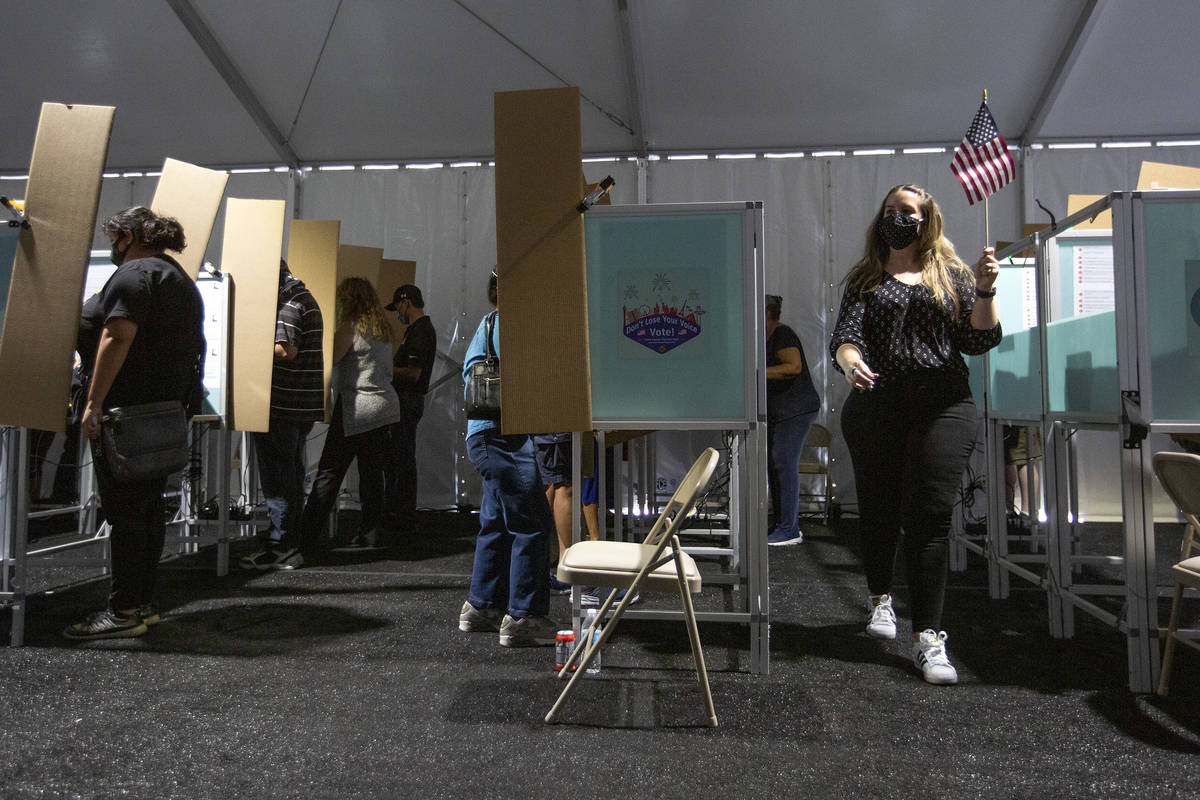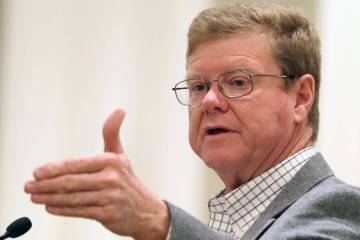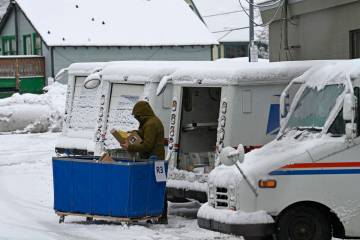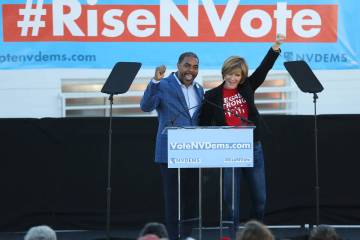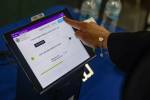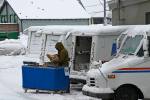FAQ: Everything you need to know about Election Day
The general election of 2020 is fast approaching on Nov 3. Here’s everything you need to know about how to participate in voting in Nevada.
What do I have to do to be able to vote in the November election?
To vote in November, you have to be registered. You can register online, on the secretary of state’s website, or in person by picking up forms at any city hall, the county government center at 500 Grand Central Parkway in Las Vegas, or the Clark County Elections Department headquarters at 965 Trade Drive in North Las Vegas.
It’s also important that, if you’ve moved since you last voted, that you update your current address, which can also be done online or in person.
What if I procrastinate until the very end? Can I still register on Election Day and vote?
Yes, Nevada now allows same-day voter registration at in-person polling places. To register, you must bring your Nevada picture identification with you to the polls. If the address on your driver’s license isn’t current, you must also bring proof of residency, such as a utility bill. You will be allowed to cast a provisional ballot only, which will be counted only after officials determine you haven’t already voted in the election by other means.
New Nevada residents who don’t have state-issued identification won’t be allowed to register and vote on the day of the election, but starting Sept. 19 the Nevada DMV began offering Saturday appointments for new arrivals to obtain state identification. The paper receipt issued by the DMV will be accepted as proof of Nevada identification for purposes of same-day registration.
What’s an “inactive” voter? Can they still vote?
A voter becomes inactive after an election postcard sent to his or her last known address is returned as undeliverable. Inactive voters are still registered to vote, however, and can do so in any election. A person’s voter registration will be canceled after he or she misses voting in two successive general elections, and that person will have to re-register in order to vote.
When will my mail ballot arrive?
In Clark County, ballots are set to be mailed starting Oct. 7, but they will be mailed earlier in some rural counties in Nevada. If you don’t receive a mail ballot, you should contact your county’s clerk or registrar of voters. In Clark County, you can reach the registrar of voters at 702-455-8683 or online.
Before you get your mail ballot, however, you will receive your sample ballot, which shows all the races that will appear on your actual ballot. That document also has important voting instructions. You will also get a supplement that will contain all the information pertaining to the five ballot questions on the November ballot.
What’s the difference between a “mail ballot” and an “absentee ballot”?
Practically, nothing. Technically, mail ballots are those sent to people who live in small, far flung areas known as “mail precincts,” who automatically get a ballot sent to them every election, and an “absentee” ballot is one specifically requested by a voter. But under AB4, every active registered voter in Nevada will receive a ballot by mail, even if they didn’t request one. All of those mail ballots will be labeled “absentee ballot.”
In terms of voting, however, there is no difference; mail and absentee ballots are counted in exactly the same way.
What do I have to know about voting by mail?
First, because of the number of candidates running this year, your ballot will be two pages, with races appearing on both the front and on the back of each page.
Second, when you fill out your ballot, use a blue or black pen to fill in the oval next to the name of the candidate you want to vote for (don’t make a check mark or an X). Automated machines will scan your ballot to register your choices, so it’s important you don’t sign your actual ballot or make any other extraneous marks on it.
If you make a mistake, simply cross out the name of the person you initially voted for, and fill in the oval next to the name of the person you actually wanted. Don’t use Liquid Paper or correction tape to fix the error.
Third, make sure you fold your completed ballot, put it inside the security sleeve, and return your ballot in the envelope provided. Include only one ballot per envelope. Envelopes with more than one ballot will be set aside and not counted.
Fourth, and most important, sign the outside of your ballot envelope! Your signature will be compared to the signature on file at the county’s election office for security purposes. If they don’t match, your ballot will be set aside while the county tries to contact you to make sure you’re an eligible voter. You will have to present identification to verify your identity in that event.
You don’t have to put postage on your return envelope. It’s already been paid.
What if I forget to sign the outside of my mail ballot, or don’t want to sign it? What happens then?
If your ballot envelope is unsigned, it will be set aside and not counted while the county tries to contact you to make sure you are the registered voter who sent the ballot. You’ll be asked to provide identification. If the county cannot reach you, your ballot may not be counted.
I don’t trust the U.S. Postal Service to get my ballot to the county. Is there another way to turn it in?
Yes, you may drop off your ballot at any of the 35 early voting centers that will be operating during early voting, or any of the 125 voting centers that will be open from 7 a.m. to 7 p.m. on Election Day. You don’t have to wait in line, either: Just locate the ballot box that will be staffed by a volunteer and drop your ballot there.
Also, you can drop your ballot off in the city clerk’s office of any valley city during normal business hours from Sept. 28 through Oct. 29. (City offices are generally closed on Fridays, however.)
In addition, Nevada voters can track their ballot as it moves through the mail, from the printer to their home, and then from the post office back to the county, by this using ballot tracking service from ballottrax.
What if I only vote in a couple races, such as president or Congress? Will my vote still count?
Yes, even if you don’t vote in every single race on the ballot, your votes in the races that you do choose to vote in will still be counted.
What is “ballot harvesting”? Is it legal?
Ballot harvesting is a common — and pejorative — term for someone who’s unrelated to a voter collecting his or her ballot to turn in on behalf of that voter. It was illegal until the August special session, when the Legislature in AB4 specifically authorized it.
People who collect ballots on behalf of others must turn them in within three days, or by Election Day, whichever is sooner, and are prohibited from altering, destroying or discarding the ballot. Violation of this law is a felony.
What if I don’t want to vote by mail? Can I still vote in person?
Yes, absolutely. There will be 125 voting centers on Election Day in Clark County as well.
Do I need to bring my mail ballot to the polls if I decide to vote in person? What if I forgot it at home?
You may surrender your mail ballot at the polls if you decide to vote in person, but it’s not required that you do so. If you cast an in-person vote, your mail ballot will be automatically canceled. However, you will be asked to sign an affidavit promising that you will not vote your mail ballot if you decide to vote in person.
Do I need an ID to vote?
Generally, no. If you have registered to vote, your identity has already been verified by the state and you won’t need to show identification at a polling place. However, you will be asked to sign in on a tablet computer, and your signature will be matched to the one on file at the county elections office. If your signature doesn’t match, you may be asked to provide identification or answer certain challenge questions to prove your identity.
Also, if you are registering to vote for the first time during early voting or on Election Day, you will be asked to provide current Nevada identification (a driver’s license, an identification card or a tribal identification card). If your address on your driver’s license or state-issued ID card isn’t current, you may also be asked to provide proof of residency, such as a utility bill.
What if I’m a felon? Can I still cast a vote?
Yes, under a law passed in 2019, once a person is released from prison, he or she can immediately register to vote, even if your voter registration was previously canceled because of a felony conviction. This also applies to people on probation or out on parole. You can find more information on the county’s website.
What happens if I mail in my ballot but also try to vote in person to make sure that my vote is counted?
Voting or attempting to vote more than once in the same election is a felony in Nevada, and people have been prosecuted and convicted of that crime. If you attempt to vote in person when you’ve already mailed your ballot, the county’s electronic system will tell poll workers that you’ve already voted.
But you don’t need to attempt to “double-check” that your ballot was received by trying to vote at the polls; you can go online to the secretary of state’s website or the Clark County elections department website and check your voter history. (After you’ve cast your mail or in-person ballot, your voter history will record that you voted in the 2020 general election.)
Will there be long lines in the general election like there were in the primary?
No. During the primary election, officials decided to conduct voting almost entirely by mail, with only one in-person voting location per county. (Clark County was the lone exception, with three locations.)
But during the general election, there will 125 voting centers on Election Day, so that should cut down on long lines.
However, the Clark County ballot contains more than 75 individual races and contests, as well as five ballot questions, the longest ballot that voters here have ever seen, so voting may take longer than it has in the past. Voters who want to be sure to avoid getting caught in a line should take advantage of mail voting. If you do decide to vote in person, however, officials recommend you study your sample ballot in advance so you can quickly make choices when you get in the voting booth.
Who is in charge of counting the ballots in Nevada? Is it the governor?
No, Gov. Steve Sisolak has nothing to do with elections. Ballots in Nevada are counted by local elections officials, the county clerk or the county registrar of voters and their staffs. Statewide, voter registrations are overseen by Secretary of State Barbara Cegavske, who works with local officials to ensure elections are conducted properly.
I’ve heard a lot of concerns about voter fraud. Where can I find out more about election security?
The secretary of state’s office has posted a “myths versus facts” document on its website to address some of the common concerns about voter fraud, which is more difficult to commit than some would have you think.
Not only are ballot envelopes individually bar coded to specific voters, they are printed on special paper that makes them impossible to counterfeit easily. In addition, officials verify signatures on the outside of ballot envelopes, and set aside those that don’t match for further investigation. An electronic system also prevents people from casting more than one vote in an election.
Where can I find out more information?
More questions and answers about voting in Nevada can be found on the secretary of state’s website or on the website of the Clark County elections department.
Where can I find results on Election Night?
Election results for statewide races will be published on the secretary of state’s website, and county races will be published on its website as well. Visit the Review-Journal’s website for continuous coverage of the 2020 election and the results on Election Day.
Contact Steve Sebelius at ssebelius@reviewjournal.com or 702-383-0253. Follow @SteveSebelius on Twitter.



